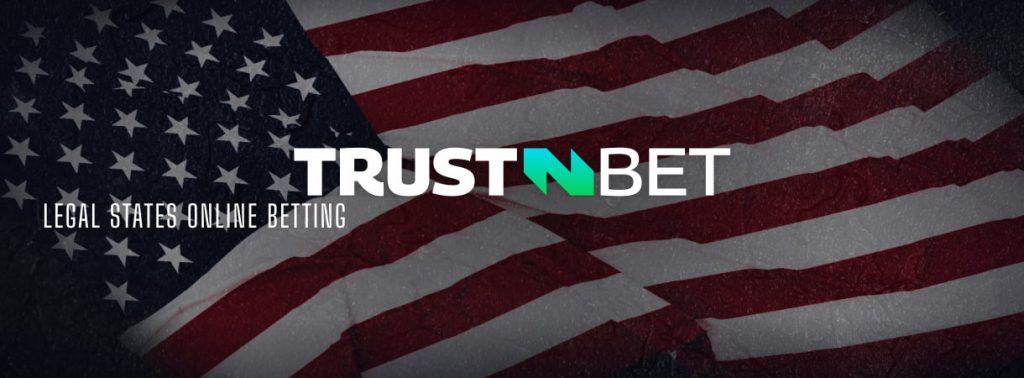US States Where Online Sports Betting Is Legal

Are you wondering where to place legal sports bets in the United States? There are 50 states in the US, and they all have different sports wagering regulations.
While there are only some states where online betting is legal, some jurisdictions have restrictions or bans in place. Others have bills pending or are still considering legislation.
Yes, the landscape of legal betting in America is quite complex. That’s why we have broken it down for you. On this page, you will find a clear and detailed overview of the legal sports betting states in the US, the territories to avoid, and the best sportsbook apps in the country.
🔑 Key Takeaways
- Discover our top 5 legal online sportsbook in the USA.
- You can legally engage in online sports betting in 32 states, find in which one!
- Check this page for regular updates on the legal online betting status of your state.
Top 5 Legal Online Sportsbooks in the US
You are spoiled for choice when it comes to wagering online in the United States. As long as you reside in a state that fully legalizes online sports betting, you can choose from various top-notch bookmakers.
Here are our top 5 legal online sportsbooks in the US:
Overview of Online Sports Betting Legislation in the USA
- May 2018: The US Supreme Court repealed the Professional and Amateur Sports Protection Act (PASPA), beginning the legalization and expansion of sports betting in the United States. With the overturning of the federal sports betting ban, states attained the freedom to legalize and regulate sports wagering as they deem fit.
- June 5 2018: Delaware became the first state to launch full legal retail single-game sports betting in the country. In the same year, states like New Jersey (June 14), Mississippi (July 22), West Virginia (August 30), New Mexico (October 16), Pennsylvania (November 16) and Rhode Island( November 26) launched their legal sports betting markets.
- August 6 2018: New Jersey became the first jurisdiction to introduce online sports betting, with DraftKings Sportsbook launching its mobile app.
- May 3, 2019: Iowa legalized sports betting, which was soon followed by Indiana (May 13), New Hampshire (July 12), Iowa (August 15), and Oregon (August 27).
- 2020: This year, seven states regulated online sports wagering: Montana, Colorado, Illinois, Virginia, Washington DC, and Tennessee.
- 2021: In 2021, eight states joined the list of US jurisdictions with legal sports wagering, including Arizona, Michigan, Connecticut, Louisiana, Wisconsin, Wyoming, South Dakota and North Dakota.
- 2022: New York launched its retail and online sports betting market. Maryland, Kansas, Louisiana, and Arkansas also legalized the venture.
- 2023: 2023 saw the arrival of Ohio, Massachusetts, Kentucky, Maine, and Florida into the market.
- 2024: So far, Vermont and North Carolina have launched legalized wagering markets.
States Where Online Sports Betting is Fully Legal
From the table above, we can see that 38 states and the District of Columbia legalize sports wagering, but not all allow online or mobile betting.
When did sports betting become legal in the USA? Of course, it is proper to each existing state. While some of them are still on the bench here, the majority of them allow online sports bets, or will soon enough.
Interestingly, the states that support mobile wagering also share different specific regulations that make them distinct. These differences include allowed bet types, taxation, legal sports betting age restrictions and more.
32 States That Accept Online Sports Betting in the US:
- Online sports betting in Arizona:
- On April 15, 2021, Governor Doug Dicey signed HB 2772, legalizing retail and online sports betting in Arizona.
- In September, the state officially launched its sports betting market with several operators, including DraftKings, FanDuel and BetMGM.
- Arizona imposes a 10% monthly tax rate on gross gaming revenue (GGR) for sports betting operators.
- It does not accept bets on high school sports or college prop bets.
- Online sports betting in Arkansas:
- Regulated by the Arkansas Racing Commission, the Natural State launched its online sports betting market in March 2022.
- Three operators available: BetSaracen, Oaklawn and Southland Resorts (Betly).
- It had previously legalized retail wagering in June 2019.
- The state allows every form of sports wagering, including college prop bets.
- Football is the most popular sport among bettors in the state.
- Online sports betting in Colorado:
- Colorado joined the ranks of legal sports betting states on May 1, 2020.
- The state has over 20 mobile sportsbooks, including FanDuel, DraftKings, BetMGM and Bet365.
- You must be 21 or older and physically within the state borders to place bets.
- The state has a 10% tax rate on monthly online sports betting revenue, which is relatively low compared to other jurisdictions in the US.
- Online sports betting in Connecticut:
- Legal online sports betting began in Connecticut in October 2021.
- The Connecticut State Department of Consumer Protection regulates the sports wagering market.
- Residents have three online sportsbooks to choose from, including FanDuel, DraftKings and Fanatics.
- The state mandates an 18% tax rate on online sports betting revenue and 13.75% for retail.
- Online sports betting in Delaware:
- Delaware was one of the first states that legalized sports betting in 2018 but did not approve online wagering until January 3, 2024.
- Delaware residents are faced with only one option to satisfy their online sports betting thirst: BetRivers.
- Although each Delaware casino offers internet sports wagering through a unique URL, they all use the same BetRivers platform.
- Online sports betting in Illinois:
- In 2019, Governor JB. Pritzker signed a bill legalizing online and retail sports betting in the Praire State.
- Several sportsbooks operate in the jurisdiction, including BetRivers, BetMGM, Caesars, DraftKings and FanDuel.
- While the state allows bets on college teams, it restricts wagering on in-state colleges online.
- The state imposes a 15% tax rate on monthly sports betting revenue.
- Online sports betting in Indiana:
- Indiana became a legal online sports betting state in September 2019 after Governor Eric Holcomb signed the sports betting bill.
- The Indiana Gaming Commission is tasked with setting regulations and overseeing the state’s betting market.
- Operators must pay a $100,000 non-refundable application fee to operate in Indiana.
- They also have $500,000 in cash reserves.
- Online sports betting in Iowa:
- On August 15, 2019, Iowa legislators passed HF 2497, legalizing sports betting in the region.
- At first, bettors had to visit one of Iowa’s casinos to sign up for a mobile sportsbook account.
- Since January 2021, the state has allowed remote registration, enabling users to register and bet online anywhere in the state.
- The Iowa Racing and Gaming Commission oversees the market.
- Online sports betting in Kansas:
- Online sports betting was authorized in Kansas in May 2022.
- The first online sportsbooks launched in the state on September 1, 2022.
- Now, the state has six operators, including DraftKings, FanDuel, BetMGM, Caesars, and Fanatics.
- The state collects 10% of the revenue generated monthly from sports betting.
- Online sports betting in Kentucky:
- Kentucky launched its online sports wagering market on September 28, 2023, three weeks after its retail betting sector went live.
- The Bluegrass State has a legal betting age of 18 years or older.
- It is home to seven betting apps, including BetGM, FanDuel, bet365 and more.
- Kentuckians can bet on all events except high school sports.
- Online sports betting in Louisiana:
- Louisiana legalized mobile sports betting in 55 of its 64 parishes in January 2022.
- The state’s sports wagering law allows for as many as 41 online books to launch.
- Only six operators currently accept mobile bets in the jurisdiction: including BetMGM, FanDuel and DraftKings.
- The state recently bans wagering on college prop bets.
- Online sports betting in Maine:
- Online sports betting became legal in Maine on November 3, 2023.
- Only the four federally recognized Indian tribes in the state can operate mobile betting.
- While Caesars partnered with three tribes, DraftKings joined forces with the fourth tribe, the Passamaquoddy Tribe.
- The state’s legal age for sports betting is 21.
- Online sports betting in Maryland:
- Maryland was the second state to launch mobile betting during the 2022-2023 NFL season, particularly on November 23, 2022.
- The state launched retail sports betting almost a year earlier after Governor Larry Hogan signed HB 940.
- Maryland has 11 operators, including BetMGM, BetRivers, Caesars, PointsBet, DraftKings and FanDuel.
- Online sports betting in Massachusetts:
- While retail sports betting was launched in Massachusetts on January 31, 2023, the online sports betting market went live on March 10, 2023.
- The state has six online sportsbooks, including DraftKings, FanDuel, ESPN Bet and Fanatics.
- The state accepts betting on most professional and collegiate sports.
- It restricts high school and youth sports wagering.
- Online sports betting in Michigan:
- Online betting has been legal in Michigan since January 2021.
- You must be 21 years old to place bets online in the state.
- About 13 sports betting apps cater to Michigan bettors, including DraftKings, Caesars, FanDuel, and BetMGM.
- The Michigan Gaming Control Board regulates and oversees the state’s betting market.
- Online sports betting in Montana:
- The Treasure State legalized sports betting in May 2019.
- It fully launched its online and retail sports betting market in March 2020
- Only one sports betting app is available in the state: Sports Bet Montana, operated by the state lottery.
- You must be 18 or older to place a sports bet in this jurisdiction.
- Online sports betting in Nevada:
- With the launch of the STN Sports app in 2010, Nevada became the first state to launch online sports betting in the US.
- It was also the only state with legal sportsbooks until 2018 when the PASPA was repealed.
- The state features several legal mobile betting operators, including TI Sports, Antlatis Sports, BetMGM, and STN Sports.
- One must visit a casino to register for an account on these online bookies.
- Online sports betting in New Hampshire:
- New Hampshire legalized sports betting in July 2019, but the first bets were placed in December 2019.
- The state chose DraftKings as its sole sports betting operator.
- You must be 18 years old to bet in this jurisdiction.
- New Hampshire prohibits bets on in-state college teams and taxes sports betting revenue at 51%.
- Online sports betting in New Jersey:
- New Jersey legalized sports betting in 2012 but was engaged in a legal tussle with the federal government for six years over PASPA.
- The legal battle ultimately led to the Supreme Court overturning the act in 2018.
- It allowed the state to accept its first legal sports bets on June 14, 2018.
- The state launched its online sports betting market in August of the same year.
- Online sports betting in New York:
- Online sports betting became legal in New York in 2021.
- The state’s online betting market went live on January 8, 2022.
- There are currently nine sportsbook apps in the state, including BetMGM, FanDuel, BetRivers, DraftKings, Caesars and more.
- New York has one of the country’s highest sports betting tax rates at 51%.
- Online sports betting in North Carolina:
- On March 11, 2024, online sportsbooks started accepting sports bets in North Carolina.
- To commemorate the launch, Gov. Roy Cooper placed a ceremonial bet on the Hurricanes to win the 2024 NHL Stanley Cup championship.
- The state allows parimutuel horse race wagering and college sports bets.
- It pegs 21 as its minimum age for betting online.
- Online sports betting in Ohio:
- Ohio introduced online sports betting on January 1, 2023.
- The state has 25 licenses available, but currently houses 19 online sportsbooks. Ohio restricts bets on high school sports, college props or futures or any college games involving Ohio teams.
- The state has a 20% tax on monthly mobile and retail sports betting revenue.
- Online sports betting in Oregon:
- Oregon launched its online sports betting market in August 2019, with DraftKings being the only operator available in the state.
- Bettors visiting Spirit Mountain Casino can wager with the BetMGM mobile app as long as they are within the property.
- You must be 21 years or older to bet online in the Beaver State.
- Online sports betting in Pennsylvania:
- Pennsylvania joined the online sports betting train on May 31, 2019, after legalizing it in 2017.
- The state imposes a high 36% tax rate on online sports betting revenue.
- It is home to over 12 operators, including Barstool, BetMGM, BetAmerica, SugarHouse Sportsbook, Unibet, and more.
- As long as you are 21 years or above, you can wager anywhere in the state.
- Online sports betting in Rhode Island:
- Rhode Island is another state you can wager on sports if you are at least 18 years old.
- The state launched its one sports betting market on November 26, 2018.
- The Rhode Island Lottery operates an online sportsbook called Sportsbook Rhode Island, the only available betting platform in the state.
- The Ocean State does not allow betting on in-state college teams.
- Online sports betting in Tennessee:
- Tennessee offers a pretty unique legal sports betting setup: while online betting is legal, retail or in-person betting isn’t.
- The state legalized online sports betting in May 2019 and officially launched the market in November 2020.
- With nine online operators available, you can wager on various options on your mobile in the state.
- Online sports betting in Vermont:
- Vermont launched its online sports betting sector on January 11, 2024.
- Like Tennessee, the state only offers sports betting online, meaning there are no retail sportsbook locations in the jurisdiction.
- The Department of Liquor and Lottery is responsible for regulating the betting sector.
- The state bans betting on college sports, and wagering is allowed at a minimum age of 21.
- Online sports betting in Virginia:
- Virginia’s mobile sports betting market went live on January 21, 2021.
- Since then, nearly 15 online bookies have entered the state, offering Virginia residents a wide range of betting options.
- You must be 21 or older to sign up and access these sportsbook offers.
- The Virginia Lottery regulates and awards licenses to operators in the market.
- Online sports betting in Washington:
- The first sportsbook started accepting bets in Washington State in September 2021, though sports betting was legalized in March 2020.
- While the state allows online betting, you can only use the apps on the grounds of a tribal casino property.
- The three available sportsbooks in the state are BetMGM, Snoqualmie Casino Sports and Caesars.
- Online sports betting in Washington, DC:
- Online sports betting arrived in the District of Columbia on May 29. 2020.
- Sports betting is open to individuals aged 18 and above in the state.
- Legal sportsbooks in the state include BetMGM, Caesars, and GambetDC. You must be present within tribal casino properties to use these sportsbook apps.
- College sports betting is allowed, with the exception of in-state teams.
- Online sports betting in West Virginia:
- In December 2018, West Virginia joined the league of the first states to introduce online sports betting.
- The state has nine regulated online sportsbooks, including BetMGM, FanDuel, BetRivers and Caesars.
- The legal minimum age for betting in the state is 21.
- Wagering on in-state college games and teams is allowed.
- Online sports betting in Wyoming:
- Wyoming is one of a handful of states that authorize an online-only sports betting framework.
- The state legalized sports betting in April 2021 and now has four sportsbook apps, including BetMGM, FanDuel, DraftKings and Caesars.
- The minimum age to place a bet in this state is 18.
- Wyoming has a 10% tax on monthly sports betting gross proceeds.
States in the Process of Legalizing Online Sports Betting
While some states have not legalized online sports betting, there are currently moves being made in their legislature to make it a reality. Others are facing setbacks and delays, but still show promise for the future.
Let’s take a closer look at these 5 states:
- Online sports betting in California:
- The main hurdle facing the legalization of sports betting in California has been the ongoing dispute between tribal nations and legislators over control and revenue sharing.
- In 2022, the two sides introduced different bills, Prop 26 and Prop 26, to legalize sports betting in the state. However, the bills failed to garner enough support from voters.
- New bills have been introduced in the California legislature that seek a sports betting legislation compromise that works for both parties.
- One of them, AB 258, will allow tribes and commercial operators to offer sports betting.
- Online sports betting in Georgia:
- In February 2024, Georgian senators approved a state constitutional amendment that would see voters decide on sports betting in November.
- However, the effort failed after lawmakers couldn’t agree on how to allocate the funds collected on sports betting taxes.
- Online sports betting in Minnesota:
- Minnesota has been discussing legalizing sports betting in its jurisdiction since 2018.
- Recently, Rep. Zack Stephenson introduced a bill: HF2000, to authorize and regulate sports wagering in the state.
- The bill has been approved by the judiciary, public safety, state and local government, human services and house taxes committees.
- Online sports betting in Missouri:
- In May 2024, the campaign launched by Missouri professional sports teams to legalize sports betting in the state recorded more than 340,000 voter signatures.
- The figure marks a significant increase over the 170,000+ valid signatures required by law to qualify the initiative for the ballot in November.
- With the development, Missouri voters now have the opportunity to decide whether sports betting should be legalized in their state.
- Recent polls have indicated that over 60% of Missourians support the venture.
- Online sports betting in Hawaii:
- Recent moves suggest that Hawaii lawmakers may want to authorize sports betting in their jurisdiction.
- On Feb 7, 2024, the Hawaii House Committee passed HB 2765, an online sports betting bill. On May 2, 2024, the House approved a study into sports betting.
States Where Online Sports Betting Remains Illegal
There are still several jurisdictions in the US where it is highly unlikely that sports betting will be legalized in the near future. These American states are expected to maintain their prohibition on sports betting due to several factors, including:
Strong Tribal Gaming Interests
Online sports betting in Oklahoma: While Gov. Kevin Stitt has expressed his support for sports betting, he is getting stiff opposition from the tribal leaders who have continued to maintain that legalizing sports betting will violate their gaming agreements
Conservative Politics
Online sports betting in Alabama: On February 14, 2024, the House of Representatives approved a bill that would have authorized sports betting in the jurisdiction amidst other measures. However, upon getting to the Senate, the bill was scaled down, leading to the removal of the sports betting provision from the legislation.
Limited Political Will
Online sports betting in Alaska: Alaska’s last sports betting bill in 2020 couldn’t progress because of the Covid-19 pandemic. Since then, there has been limited legalization to authorize sports betting.
Online sports betting in Idaho: None of Idaho’s legislators have submitted a bill to legalize sports betting since PASPA was overturned in 2018
Existing Laws
Online sports betting in Texas: Texas has not legalized sports betting, primarily due to existing provisions prohibiting gambling expansion in the state. Amending the state’s constitution demands two-thirds approval in the state’s legislature. This requirement has proven difficult to attain.
Religious Beliefs
Online sports betting in South Carolina: Sports betting bills have not thrived in the Palmetto State because of the state’s traditional view on gambling, religious views and anti-gambling stance of strong opposition, especially Gov. Henry McMaster
Legal US States for online Sports Betting
Click on the State of your interest to see more details




